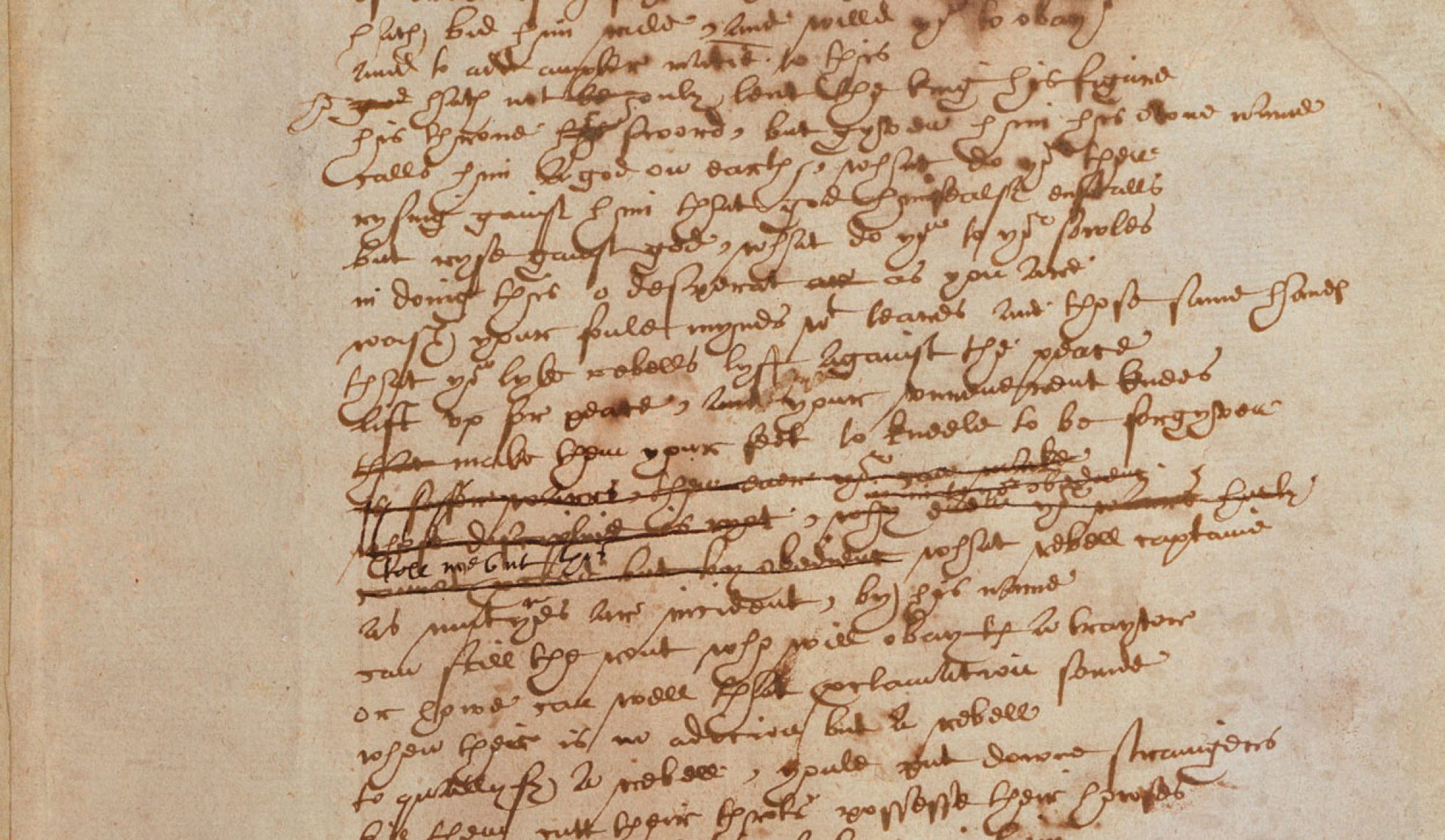Let’s look at the beginning of Act II, Scene i, focusing on the conversation between the Duke of York and the dying John of Gaunt in lines 17-68. Gaunt has just argued this his own dying words might persuade Richard, but York disagrees:
YORK
No, it [Richard’s ear] is stopped with other flatt’ring sounds,
As praises, of whose taste the wise are feared,
Lascivious metres, to whose venom sound
The open ear of youth doth always listen,
Report of fashions in proud Italy,
Whose manners still our tardy-apish nation
Limps after in base imitation.
Where doth the world thrust forth a vanity–
So it be new there’s no respect how vile–
That is not quickly buzzed into his ears?
Then all too late comes counsel to be heard
Where will doth mutiny with wit’s regard.
Direct not him whose way himself will choose,
‘Tis breath thou lack’st and that breath wilt thou lose.
GAUNT
Methinks I am a prophet new inspired
And thus, expiring, do foretell of him:
His rash fierce blaze of riot cannot last
For violent fires soon burn out themselves.
Small showers last long, but sudden storms are short;
He tires betimes that spurs too fast betimes;
With eager feeding, food doth choke the feeder;
Light vanity, insatiate cormorant,
Consuming means, soon preys upon itself.
This royal throne of kings, this sceptered isle,
This earth of majesty, this seat of Mars,
This other Eden, demi-paradise,
This fortress built by Nature for herself
Against infection and the hand of war,
This happy breed of men, this little war,
This precious stone set in the silver sea,
Which serves it in the office of a wall
Or as a moat defensive to a house
Against the envy of less happier lands,
This blessed plot, this earth, this realm, this England,
This nurse, this teeming womb of royal kings,
Feared by their breed and famous by their birth,
Renowned for their deeds as far from home
For Christian service and true chivalry
As is the sepulchre in stubborn Jewry
Of the world’s ransom, blessed Mary’s son;
This land of such dear souls, this dear, dear land,
Dear for her reputation through the world,
Is now leased out–I die pronouncing it–
Like to a tenement or pelting farm.
England, bound in with the triumphant sea,
Whose rocky shore beats back the envious siege
Of watery Neptune, is now bound in with shame,
With inky blots and rotten parchment bonds.
That England that was wont to conquer others
Hath made a shameful conquest of itself.
Ah, would the scandal vanish with my life,
How happy then were my ensuing death!
I’m drawn to this passage because it so cleverly plays with the definition of “place.” What, Gaunt seems to ask, is England? Is England a location on a map, a physical landscape, or is England an imaginative location, the site of fantasy, anxiety, and the production of metaphor? In the points that follow, I’ll try to explore the tension between real and imagined spaces in this scene, as well as the ways in which that tension manifests itself through Shakespeare’s language. Per Jakobson: “In poetry, any conspicuous similarity in sound is evaluated in respect to similarity and/or dissimilarity in meaning” (87).
- There’s a sense, beginning with York’s lines, that England’s place on the world stage is precarious: “Report of fashions in proud Italy, / Whose manners still our tardy-apish nation / Limps after in base imitation” (21-23). Line 22 includes a feminine ending (“nation”), so that the meter seems to reflect York’s deflated attitude toward England (behind in fashions, trends, foolishly trying to imitation a more sophisticated nation).
- In Gaunt’s speech, we see him thinking through not only Richard’s treachery, but also England itself as an island. The island is a doubled space, at once protected from its enemies by nature of its geography, but also susceptible to its own insularity. That doubleness emerges immediately in the parallelism of the verse instance in line 37: “With eager feeding, food doth choke the feeder.”
- The speech is notable for its repetition of the word “this.” Here, Gaunt describes the ways in which England has benefited from its position as an island nation–”This fortress built by Nature for herself / Against infection and the hand of war”–before revealing that this land is “now leased out,” spoiled by Richard’s actions. I’d like to suggest that this repetition of “this” creates a sort of “fortress” of words, creating a chain of language that is then broken by Gaunt’s interjection “I die pronouncing it.” In effect, the language forms a barrier that is suddenly broken, just as Richard has ruined England’s privileged position as a secluded, safe, and happy island.
- Finally, notice how the physical landscape ultimately gives way to the metaphorical: “Whose rocky shores beats back the envious siege / Of watery Neptune, is now bound with shame, / With inky blots and rotten parchment bonds” (63-64). I’m interested in the ways in which these images blend and overlap: We move so quickly from the physical landscape (rocky shores surrounded by water) to the immaterial (shame now stands in for the waters around those shores) and back to the material object (the paperwork which now, in a way, stands in for Richard’s shame!).
- In our discussion tomorrow, we might also dive more deeply into the language of property and paperwork that runs throughout this scene (the lease, ink, parchment bonds). I wonder if “the map” is also a sort of paperwork that looms behind these images? Then again, I might be running away with that idea a bit…
I look forward to hearing everyone’s thoughts!
‘Til tomorrow,
Jackie
